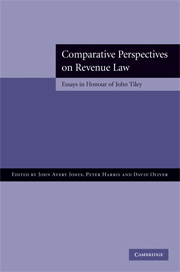Book contents
- Frontmatter
- Contents
- Contributors and affiliations
- Foreword by Dave Hartnett
- Foreword by Hugh Ault
- 1 A comparison of statutory general anti-avoidance rules and judicial general anti-avoidance doctrines as a means of controlling tax avoidance: Which is better? (What would John Tiley think?)
- 2 The judicial approach to avoidance: some reflections on BMBF and SPI
- 3 Comparing the application of judicial interpretative doctrines to revenue statutes on opposite sides of the pond
- 4 Abuse of rights and European tax law
- 5 The US legislative and regulatory approach to tax avoidance
- 6 The law of taxation and unjust enrichment
- 7 The history of royalties in tax treaties 1921–61: Why?
- 8 Land taxation, economy and society in Britain and its colonies
- 9 Meade and inheritance tax
- 10 Taxation, human rights and the family
- 11 Family connections and the corporate entity: income splitting through the family company
- Epilogue: Establishing the foundations of tax law in UK universities
- References
- Table of cases
- Table of abbreviations
- Index
Foreword by Dave Hartnett
Published online by Cambridge University Press: 07 December 2009
- Frontmatter
- Contents
- Contributors and affiliations
- Foreword by Dave Hartnett
- Foreword by Hugh Ault
- 1 A comparison of statutory general anti-avoidance rules and judicial general anti-avoidance doctrines as a means of controlling tax avoidance: Which is better? (What would John Tiley think?)
- 2 The judicial approach to avoidance: some reflections on BMBF and SPI
- 3 Comparing the application of judicial interpretative doctrines to revenue statutes on opposite sides of the pond
- 4 Abuse of rights and European tax law
- 5 The US legislative and regulatory approach to tax avoidance
- 6 The law of taxation and unjust enrichment
- 7 The history of royalties in tax treaties 1921–61: Why?
- 8 Land taxation, economy and society in Britain and its colonies
- 9 Meade and inheritance tax
- 10 Taxation, human rights and the family
- 11 Family connections and the corporate entity: income splitting through the family company
- Epilogue: Establishing the foundations of tax law in UK universities
- References
- Table of cases
- Table of abbreviations
- Index
Summary
It is a real pleasure and a privilege to have prepared this foreword to a collection of essays honouring John Tiley as he nears retirement from the chair in Taxation Law at Cambridge University. The essays have been prepared by some of the most insightful writers on tax of recent times, all of them friends of John and some of them former students. In the paragraphs that follow I have described my personal experience of John, set out to say something about his achievements as one of the leading tax thinkers of modern times and then attempted to reveal something of the man that may not be readily apparent from his writings.
I first met John in the foyer of the Cambridge Law Faculty. As I walked in, he recognised me immediately – I still do not know how – and I realised that I was with the person who had been influencing my understanding of tax from the very first days of my career in the Inland Revenue.
In the second half of the 1970s, the Inland Revenue training regime for graduate entry tax inspectors was demanding, with a pass mark in internal examinations of 70 per cent. Tax cases had to be learnt by rote, which came hard after several years spent in research and university teaching. For a while, tax seemed a lot less stimulating than Cicero's speeches or letters.
- Type
- Chapter
- Information
- Comparative Perspectives on Revenue LawEssays in Honour of John Tiley, pp. x - xvPublisher: Cambridge University PressPrint publication year: 2008

